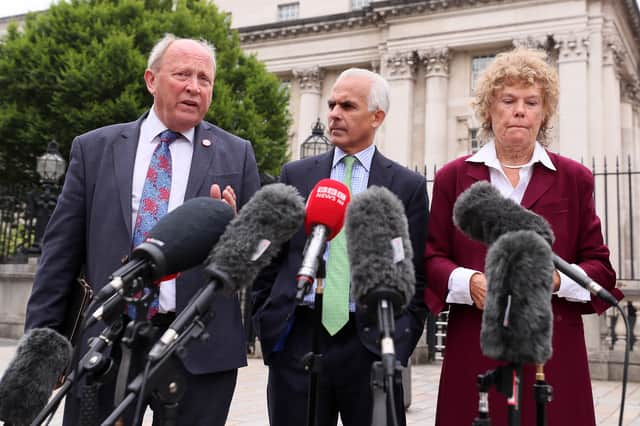Northern Ireland Protocol: Judgment reserved in Unionist legal challenge to Irish Sea border


Counsel for the Government argued that the post-Brexit arrangement has primacy by suspending part of the Act of Union 1800.
Responding in a pan-unionist challenge to the protocol, Tony McGleenan QC also rejected any claims that it threatens Northern Ireland’s constitutional status.
Advertisement
Hide AdAdvertisement
Hide AdHe said: “The suggestion that there’s been some shattering of the Union is not sustainable.”
Judgment was reserved following a two-day hearing on the legality of the protocol implemented to prevent a hard Irish border.
Since it came into force at the start of 2021 Northern Ireland has remained in the EU single market for goods.
But disruptions and checks on produce entering the region from Britain has created a de facto customs border in the Irish Sea.
Advertisement
Hide AdAdvertisement
Hide AdA coalition including TUV leader Jim Allister, Baroness Hoey and former Brexit Party MEP Ben Habib are attempting to have the accord declared unlawful.
Earlier this year a High Court judge found that the Withdrawal Agreement Act, which introduced the protocol, conflicts with Article 6 of the Act of Union, drawn up to ensure equal trade footing between Britain and Ireland.
However, he ruled that the new legislation overrides older law which cannot obstruct the clear specific will of Parliament.
Those findings are being appealed on the basis that the Act of Union has legal supremacy, with no power for the implied repeal of a constitutional statute.
Advertisement
Hide AdAdvertisement
Hide AdMr McGleenan countered by disputing there has been any repeal in a case based on parliamentary intent and sovereignty.
He told the three appeal judges that the High Court had correctly decided the Withdrawal Act suspended, or subjugated, Article 6.
“This concept of legislation being subject to, or subjugated, is by no means unorthodox,” the barrister said.
Challenged on the potential constitutional implications, he insisted the issue was about displacing anachronistic trade clauses with modern statute.
Advertisement
Hide AdAdvertisement
Hide Ad“The first premise is unsound because there’s been no change to the constitutional status of Northern Ireland,” Mr McGleenan said.
It was contended that the “political cost” of endorsing the Withdrawal Agreement was known to some of the appellants.
Identifying Mr Habib and Baroness Hoey, counsel said: “At least two of them voted for it.”
The court heard that the Act of Union was wrongly portrayed as being insulated from any later amendments.
Advertisement
Hide AdAdvertisement
Hide Ad“It’s to be interpreted like any other statute,” Mr McGleenan argued.
He went on to state that the Supreme Court has never recognised the concept of constitutional statutes, nor endorsed any hierarchy.
But John Larkin QC, for the unionist group, maintained that no answer was provided to the prohibition contained in Article 6.
“Her Majesty’s Government had no power to give a blank check to provisions (that breach) the Act of Union,” he said.
Advertisement
Hide AdAdvertisement
Hide AdMr Larkin was also dismissive of claims that the terms of the protocol can freeze the earlier legislation.
“The concept of suspension, like the accordion of a street musician, goes in and out but is fundamentally at odds with any concept of legal scrutiny.”
Reserving judgment in the appeal, Lady Chief Justice Dame Siobhan Keegan pledged: “We will provide a ruling as soon as possible.”